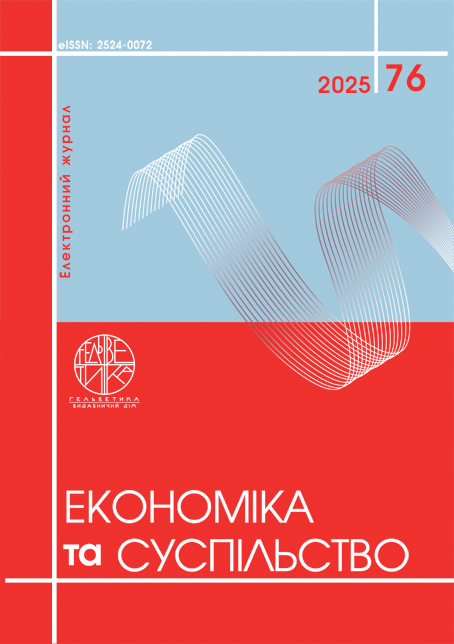HYBRID EMPLOYMENT IN UKRAINIAN IT COMPANIES: IMPACT ON PERSONNEL POTENTIAL AND PRODUCTIVITY
Abstract
The authors provided a theoretical analysis of the impact of hybrid employment on personnel capacity and productivity in Ukrainian IT companies. The article analyzed features of hybrid work's short-term and long-term effects under both pandemic and wartime conditions. The study argues that, when supported by strategic management, this form of employment can enhance organizational resilience, reduce employees turnover, and improve the efficiency of team interaction. A conceptual framework for assessing hybrid work effectiveness is proposed, covering three key dimensions: productivity, personnel capacity, and business performance. The authors recommended implementing OKR systems, HR analytics, and regular employee feedback mechanisms to improve the quality of human resource management in hybrid settings.
References
Alsaad A., Abubakar A. M., Dasuki S. Work intensification in hybrid workplace: The potential downstream effects on perceived exploitation and negative work outcomes. Technological Forecasting and Social Change. 2025. Vol. 218. P. 1–12. DOI: https://doi.org/10.1016/j.techfore.2025.124221
Deschênes A. A. Digital literacy, the use of collaborative technologies, and perceived social proximity in a hybrid work environment: Technology as a social binder. Computers in Human Behavior Reports. 2024. Vol. 13. P. 1–9. DOI: https://doi.org/10.1016/j.chbr.2023.100351
Dmytrenko, M. Autonomously, but not isolated: how to work effectively in a hybrid format. Available at: https://happymonday.ua/yak-efektyvno-pratsiuvaty-v-hibrydnomu-formati (Accessed: 18 July, 2025).
Griva A., Chandra Kruse L., Hattinger M., Högberg K., Pappas I. O., Conboy K. Making space for time: Strategies for the design of time‐aware hybrid work. Information Systems Journal. 2025. Vol. 35, № 2. P. 611–645. DOI: https://doi.org/10.1111/isj.12552
Huo W., Yuan X., Xie J., Deng Y. Work-related use of information and communication technologies after-hours (W_ICTs) and workplace cheating behavior: A chained mediation model. Advances in Education, Humanities and Social Science Research. 2023. Vol. 4, № 1. P. 42. DOI: https://doi.org/10.56028/aehssr.4.1.42.2023
Korostashovets A. Hybrid Remote Work: The Future of a Flexible Approach to Work. Available at: https://worksection.com/ua/blog/hybrid-remote-work.html (Accessed: July 01, 2025).
Lipych L., Kushnіr M., and Khіlukhа O. Employee Perceptions, Advantages, Disadvantages, and Expectations of the Hybrid Work Model. Achievements of the Economy: Prospects and Innovations. 2024. № 10. P. 1-16. DOI: https://doi.org/10.5281/zenodo.13851236
Meluso J., Johnson S., Bagrow J. Flexible environments for hybrid collaboration: Redesigning virtual work through the four orders of design. Design Issues. 2022. Vol. 38, № 1. P. 55–69. DOI: https://doi.org/10.1162/desi_a_00670
State of Hybrid Work 2023. Owl Labs. Available at: https://owllabs.eu/state-of-hybrid-work/2023 (accessed: July 24, 2025).
The Future of Jobs Report 2025. Available at: https://reports.weforum.org/docs/WEF_Future_of_Jobs_Report_2025.pdf (accessed: July 24, 2025).
Zamani E. D., Watson-Manheim M. B., Abbott P., Lin A. The new wave of ‘hybrid’ work: An opportunity to revise assumptions and build theory. Information Systems Journal. 2025. Vol. 35, № 2. P. 710–719. DOI: https://doi.org/10.1111/isj.12558
Copyright (c) 2025 Олена Наумова, Марія Наумова

This work is licensed under a Creative Commons Attribution 4.0 International License.


